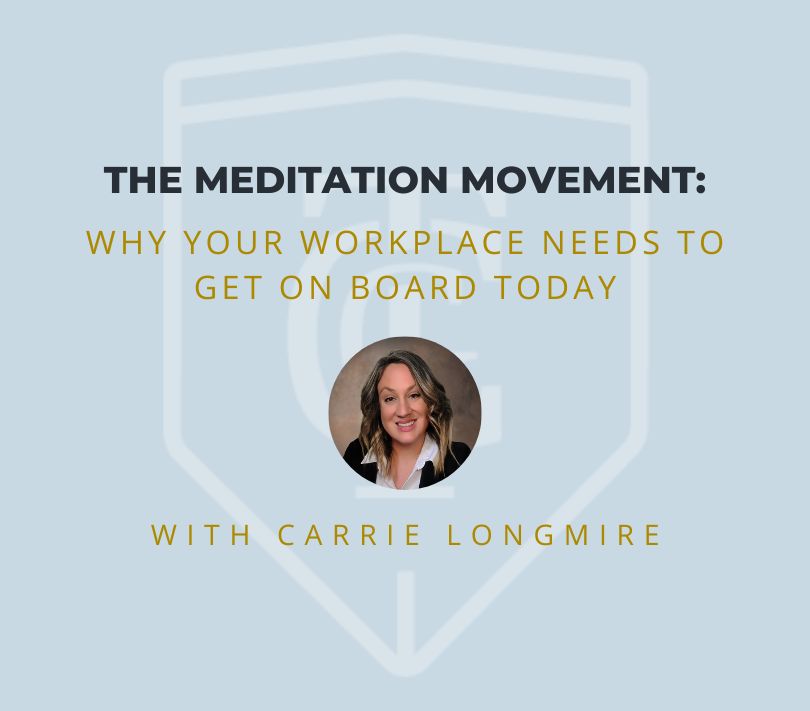The Christopher Group brings you a guaranteed guide to boost your organizational bottom line, reduce employee turnover, and decrease stress while powering up employee productivity and creativity.
Meditation is a powerful tool for reducing stress, increasing focus and productivity, and improving overall well-being. It involves training the mind to focus on the present moment, and can be practiced by anyone, anywhere, at any time. While meditation has traditionally been associated with spirituality and personal growth, it is increasingly being recognized as a valuable practice for the workplace as well.
Organizations that prioritize workplace meditation demonstrate a commitment to their employees’ well-being and mental health. By offering meditation as a practice to manage stress and improve focus, employers acknowledge that employees face challenges in their work and personal lives that can impact their mental health. By providing workplace meditation techniques and tools to manage these challenges, organizations can help their employees thrive and perform at their best.

By promoting workplace meditation, organizations empower their employees to take proactive steps to manage their mental health and well-being. This approach fosters a culture of self-care and personal responsibility, which can help employees feel more in control of their lives and work.
Moreover, offering workplace meditation techniques and support can help reduce the stigma associated with seeking mental health support. Employees who feel supported and respected by their organization are more likely to prioritize their mental health needs and seek help when they need it, which can lead to improved mental health outcomes.
Organizations that prioritize employee well-being and mental health are more likely to attract and retain top talent. Employees who feel supported and valued are more engaged and productive, leading to better business outcomes.
And because everyone likes lists, and most skip to the lists anyway, here are a few additional benefits of meditation in the workplace:
- Reduces Stress: One of the most well-known benefits of meditation in the workplace is its ability to reduce stress. In the workplace, stress can have a negative impact on employee well-being and productivity. By practicing meditation, individuals can learn to manage their stress levels and respond more effectively to stressful situations.
- Improves Focus and Productivity: Workplace meditation is also known to improve focus and productivity. By training the mind to stay present and focused, individuals can reduce distractions and improve their ability to concentrate on tasks. This can lead to increased productivity and improved performance.
- Boosts Creativity: In addition to improving focus and productivity, meditation can also boost creativity. By allowing the mind to relax and let go of distractions, individuals can tap into their creative potential and come up with innovative solutions to problems.
- Enhances Emotional Intelligence: Meditation can also enhance emotional intelligence, which is the ability to understand and manage one’s own emotions and those of others. By practicing mindfulness and self-awareness, individuals can develop a greater sense of empathy and compassion, which can improve workplace relationships and communication.
- Promotes Health and Well-being: Meditation at work can also enhance emotional intelligence, which is the ability to understand and manage one’s own emotions and those of others. By practicing mindfulness and self-awareness, individuals can develop a greater sense of empathy and compassion, which can improve workplace relationships and communication.
Lastly, because of our love of lists (I know you aren’t reading the entire article), here are 5 easy and cost-effective ways organizations can incorporate meditation into the workplace:
- Create a designated workplace meditation area: Organizations can dedicate a small area in the workplace for private meditation, such as a quiet room or a corner with comfortable seating. This area can be used by employees to practice meditation during breaks or before or after work. Providing a dedicated space for meditation shows employees that the organization values their mental health and well-being.
- Provide meditation resources: Organizations can provide resources for employees to learn more about meditation and how to incorporate it into their daily routine. This can include online resources, meditation apps, or books on mindfulness and meditation. These resources can help employees feel more comfortable incorporating workplace meditation techniques into their workday.
- Train a meditation facilitator: Organizations can train a human resources team member or other interested employee to facilitate meditation sessions. This person can lead group meditations or offer one-on-one meditation support to employees. This approach can create a culture of support and community around meditation within the organization.
- Offer meditation workshops or seminars: Organizations can bring in a meditation expert to lead workshops or seminars on mindfulness and meditation. These events can be a great way to introduce employees to the benefits of meditation in the workplace and provide them with tips and tools for incorporating it into their daily routine.
- Incorporate meditation into team meetings: Organizations can incorporate a brief meditation or mindfulness practice into team meetings to help employees stay focused and centered. This approach can help employees feel more relaxed and engaged during meetings, leading to more productive and effective collaboration.
In summary, organizations that prioritize meditation in the workplace demonstrate a commitment to employee well-being and mental health. By providing tools to manage stress and improve focus, promoting a culture of self-care and personal responsibility, and reducing the stigma associated with seeking mental health support, organizations can create a positive work environment that values employee mental health and well-being. Furthermore, organizations can encourage meditation within the organization with little expense by providing a designated meditation area, offering resources and workshops, training a facilitator, and incorporating meditation into team meetings. These actions can create a supportive and mindful workplace culture that prioritizes employee mental health and well-being.
If you implement any of these practices in your organization or if this article has inspired you to incorporate similar practices, please reach out and let me know. It would be my great honor to learn that I have made a positive impact on your life and your workplace.
About Carrie Longmire
As a servant minded and seasoned Human Resources professional with over 15 years of experience in all aspects of Human Resources, Carrie is a dedicated to and passionate about helping others achieve their professional goals. She understands the importance of a fulfilling career and how it greatly impacts one’s overall well-being and happiness.
Carrie takes the time to truly understand the needs and desires of those she works with, going beyond simply placing them in a job, but rather assisting them in achieving fulfillment in all aspects of their lives through the development and enhancement of their career. Her approach is service focused, personal, and “high touch.” She takes the time to build strong rapport with each individual to ensure the best possible career match. To learn more about Carrie visit her bio page.

